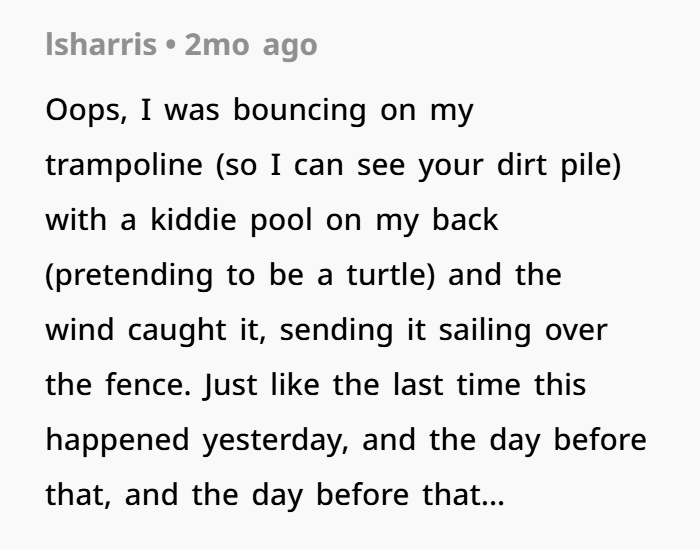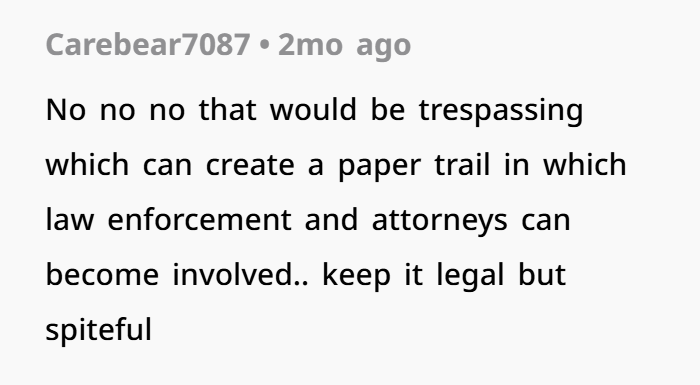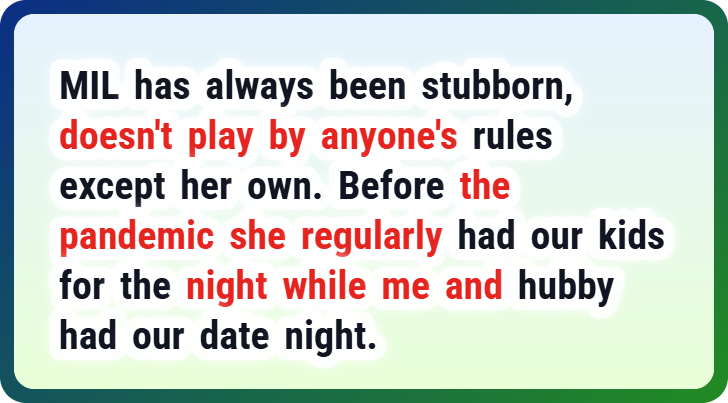Neighbor Tried to Get Our Shed Fined—So I Got His $40K Pool Filled In

In a quiet neighborhood dispute turned savage revenge, a new neighbor tried to get a woman fined over a backyard shed—despite it being fully permitted and legal. After an inspector confirmed the shed met all regulations, the neighbor remained smug, convinced he’d caused trouble. But he messed with the wrong family.
Advertisement – Continue Reading Below
The woman’s daughter discovered the neighbor’s brand-new $40,000 pool violated zoning laws—specifically, it encroached on a utility easement and sat too close to the property line. Armed with city code and photo evidence, she reported him. Within weeks, the city ordered the pool to be filled in. The once-smug neighbor now stares at a dirt pit while their legal shed stands strong. A classic tale of petty revenge meets lawful justice.
A woman dealt with a nuisance neighbor who tried to scare them off by filing a bogus complaint

She got her payback by unraveling the man’s illegal pool, which he lost, and cost him a large amount of money in the process



1. Shed Zoning Laws: What’s Legal and What’s Not
Local zoning ordinances typically require permits for permanent structures like sheds. However, most U.S. cities only enforce these when the structure exceeds certain size thresholds or is built near setbacks . In this case, the family’s shed had all necessary permits—likely submitted years ago—and passed inspection.
Advertisement – Continue Reading Below
Reporting a neighbor without verifying legality is common but rarely effective when the structure is grandfathered in or permitted. Cities maintain detailed permitting records, which protect homeowners from false complaints.

2. The Pool Mistake: Easements & Setback Violations
Unlike sheds, pools have far stricter regulations. Many jurisdictions require setbacks of at least 5–10 feet from property lines and completely prohibit building over utility easements, which are reserved areas for city maintenance or infrastructure .
By building his pool over an easement, the neighbor violated serious codes. Cities can mandate removal if access to underground lines is obstructed. In such cases, homeowners are legally obligated to comply—no exceptions for cost or inconvenience.
Advertisement – Continue Reading Below
3. Revenge Through Legal Channels: Petty or Perfect?
This situation exemplifies legal revenge—a rising trend on Reddit and TikTok where individuals use public records, building codes, or HOA bylaws to counter petty attacks. Unlike emotional retaliation, legal recourse is entirely valid and often more effective.
The daughter’s revenge wasn’t just satisfying—it was strategic. By citing specific violations and submitting visual proof, she ensured the city couldn’t ignore the complaint. These tactics mirror tactics in famous “malicious compliance” stories, where sticking to the rules causes greater impact than breaking them.
4. Financial Impact: $40K Pool Loss Is Real
Building a pool in the U.S. costs between $35,000 and $65,000 on average, according to Forbes Home. Having to fill it in due to permit violations isn’t just humiliating—it’s a financial blow with no chance of reimbursement unless insured under construction negligence.
Advertisement – Continue Reading Below
Cities rarely allow corrective construction for easement violations. Unlike a shed that can be moved, a concrete or fiberglass pool cannot be relocated. Removal or filling is often the only option.
5. HOA & City Complaint Backfire
Many neighbors file anonymous complaints to cities or HOAs expecting to remain unchallenged. However, these complaints can backfire, especially if the other party has more comprehensive knowledge of municipal law.

This is a prime example of the “don’t throw stones in a glass house” adage. The neighbor attempted to enforce code selectively—only to be undone by a more serious and irreversible violation on his side.
Advertisement – Continue Reading Below
6. Emotional Payoff & Social Harmony
While revenge rarely restores full peace, this case has one sweet result: the mom now sleeps soundly knowing her rights were upheld and her neighbor’s arrogance met natural consequences. Public Reddit responses overwhelmingly side with the daughter, seeing the punishment as both fair and proportional.
It serves as a cautionary tale—check your own violations before you report someone else’s. Because you never know what someone might find when they dig.
Most commenters lauded the woman for what she did











